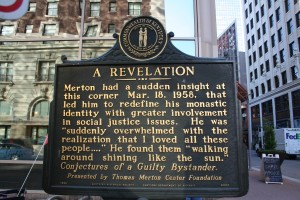![41Qm0dDKxJL._SS500_[1]](https://wp-media.patheos.com/blogs/sites/628/2011/03/41Qm0dDKxJL._SS500_1-300x300.jpg) Some of you, perhaps, have heard of Brian McLaren, an author, former pastor, activist, and leader in what’s been called the “emergent church.” I had the good fortune to be at a workshop over the weekend with McLaren, who had some fascinating things to say about the past, present, and possible future of Christianity.
Some of you, perhaps, have heard of Brian McLaren, an author, former pastor, activist, and leader in what’s been called the “emergent church.” I had the good fortune to be at a workshop over the weekend with McLaren, who had some fascinating things to say about the past, present, and possible future of Christianity.
One never knows how such church workshops are going to go. I’ve been to ones that brought new meaning to the word “tedious,” workshops where I was certain that my watch had stopped working because time could not possibly move so slowly.
McLaren’s workshop was just the opposite. I’d read some of his books, but in person he was even better: insightful, funny, thoughtful, and approachable. He was in town to promote his new book, Naked Spirituality: A Life with God in 12 Simple Words
(love that title!), but he covered a wide range of topics in his workshop.
I was most taken by the generous spirit behind his approach to religion. So much of our religious and political discourse today is fiercely partisan, and it was refreshing to hear a leader who is trying to bridge those divides. He showed a graphic that I found thought-provoking, an image of the great cultural divide that came with modernism. From that divide, two arrows diverged, one representing liberal and the other conservative trends in both the political and religious realms. As the arrows progress, their trajectory takes them farther and farther apart.
Our current age of great transformation and equally great risks requires that these divergent trajectories be altered, said McLaren. We need people with generous hearts and open minds who can find ways of worshipping, debating, learning, and wrestling with difference, so that we can bend those arrows toward a new vision. Polarization and demonization are the enemies of true religion and true community.
McLaren had one comment in particular that I appreciated: “The Church often grows most,” he said, “through the questions it chooses to ask.” For example, evangelical pastor Rick Warren struck a deep cultural nerve when he formed the question as “What is my purpose in life?” That’s a valid question, certainly, but so are these alternatives: “What is our purpose?” “What is the purpose of creation?” “What is God’s purpose?”
Interesting stuff, I think. I bought McLaren’s book and am only 30 pages into it but I like what he has to say very much. Naked Spirituality: A Life with God in 12 Simple Words
(the title comes in part from St. Francis of Assisi’s appearing naked in a church at the start of his ministry) is about 12 practices that can deepen our spiritual lives. It’s a good book to be chewing on as Lent starts this week.










